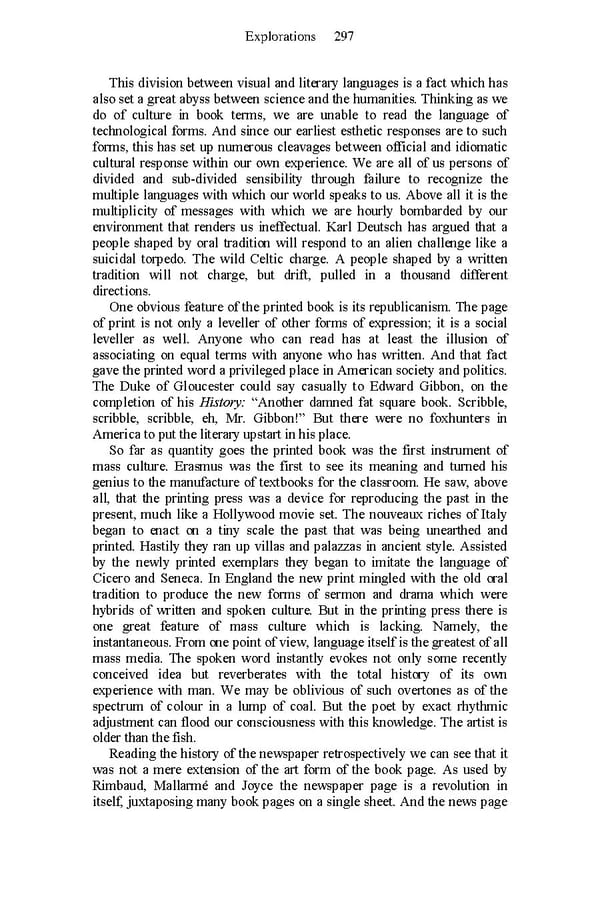Explorations 297 This division between visual and literary languages is a fact which has also set a great abyss between science and the humanities. Thinking as we do of culture in book terms, we are unable to read the language of technological forms. And since our earliest esthetic responses are to such forms, this has set up numerous cleavages between official and idiomatic cultural response within our own experience. We are all of us persons of divided and sub-divided sensibility through failure to recognize the multiple languages with which our world speaks to us. Above all it is the multiplicity of messages with which we are hourly bombarded by our environment that renders us ineffectual. Karl Deutsch has argued that a people shaped by oral tradition will respond to an alien challenge like a suicidal torpedo. The wild Celtic charge. A people shaped by a written tradition will not charge, but drift, pulled in a thousand different directions. One obvious feature of the printed book is its republicanism. The page of print is not only a leveller of other forms of expression; it is a social leveller as well. Anyone who can read has at least the illusion of associating on equal terms with anyone who has written. And that fact gave the printed word a privileged place in American society and politics. The Duke of Gloucester could say casually to Edward Gibbon, on the completion of his History: “Another damned fat square book. Scribble, scribble, scribble, eh, Mr. Gibbon!” But there were no foxhunters in America to put the literary upstart in his place. So far as quantity goes the printed book was the first instrument of mass culture. Erasmus was the first to see its meaning and turned his genius to the manufacture of textbooks for the classroom. He saw, above all, that the printing press was a device for reproducing the past in the present, much like a Hollywood movie set. The nouveaux riches of Italy began to enact on a tiny scale the past that was being unearthed and printed. Hastily they ran up villas and palazzas in ancient style. Assisted by the newly printed exemplars they began to imitate the language of Cicero and Seneca. In England the new print mingled with the old oral tradition to produce the new forms of sermon and drama which were hybrids of written and spoken culture. But in the printing press there is one great feature of mass culture which is lacking. Namely, the instantaneous. From one point of view, language itself is the greatest of all mass media. The spoken word instantly evokes not only some recently conceived idea but reverberates with the total history of its own experience with man. We may be oblivious of such overtones as of the spectrum of colour in a lump of coal. But the poet by exact rhythmic adjustment can flood our consciousness with this knowledge. The artist is older than the fish. Reading the history of the newspaper retrospectively we can see that it was not a mere extension of the art form of the book page. As used by Rimbaud, Mallarmé and Joyce the newspaper page is a revolution in itself, juxtaposing many book pages on a single sheet. And the news page
 Essential McLuhan Page 303 Page 305
Essential McLuhan Page 303 Page 305